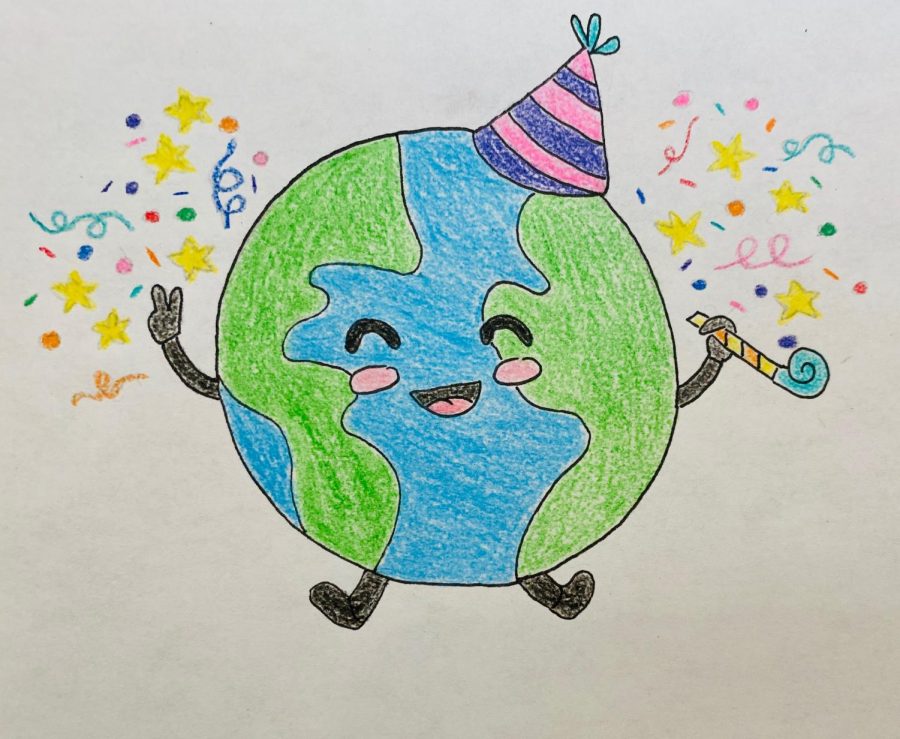Earth Day’s 50th Anniversary: Will Earth be around for 50 more?
Happy Earth Day! I’m celebrating 1.658 trillion days! Here’s to many more filled with happiness! At least I’m breathing better.
Happy birthday, Mother Earth!
Today, April 22, 2020, marks Earth Day’s 50th anniversary and the Earth has not seemed healthier in decades.
Traffic-free roads and plane-less skies have made Mother Earth the sole beneficiary of the coronavirus pandemic as air quality is drastically improving. Deserted streets beckon animals to reclaim their natural habitats that humanity has built over.
Delhi, India, the most polluted city in the world, has been hidden under a cloud of pollution for years and are under constant warning about breathing toxic air. Now that all of India is under a stay-at-home order, residents are shocked at how healthy the environment has become.
New Delhi resident, Dr. Shashi Tharoor, has spoken out to bring awareness to environmental issues. He told The Guardian that he “hopes that it was a wake-up call.
“The blissful sight of blue skies and the joy of breathing clean air provides just the contrast to illustrate what we are doing to ourselves the rest of the time,” he said.
Similarly, Bangkok, Thailand closed schools last month due to air pollution. The city that under partial lockdown, the lack of transportation pollution has altered the health and appearance of the city as the smog cleared enough for residents to enjoy looking at a blue sky.
Animals readily adapted to the absence of people. Wild boars are now spotted wandering the streets in Barcelona, Spain. Sika deer have left Japan’s Nara Park to explore nearby cities. Lions in South Africa are taking advantage of empty streets and are seen napping in the sun.
The first Earth Day was celebrated in 1970, sparking an environmental awareness movement. Each year there are rallies and protests where guest speakers ask the world to think about the environmental consequences of their choices.
This year, the coronavirus lockdowns are forcing the Earth Day celebration to go digital where speakers like Senator Elizabeth Warren and the United Nations Secretary General Antonio Gutteres plead with world leaders to take the first step towards a positive change that will benefit the Earth in the long run.
Environmentalists understand that the reduction in pollution is only temporary. When the world restarts, pollution numbers will likely skyrocket. However, they worry that the COVID-19 pandemic will come to harm the environment further as governments hope to avoid an economic recession.
During the 2008 financial crisis, China rebuilt its economy to become one of the highest pollution emitting countries in the world. When China’s economy practically shut down to contain COVID-19, their emissions reduced 25%. While those numbers are bound to skyrocket with the country beginning to reopen, scientists fear that pollution rates will climb even higher as the Chinese government pushes the economy to jumpstart.
Similarly, much progress made in the United States to reduce the country’s environmental impact has been lost. President Trump withdrew most United States environmental restrictions on polluting industries to help the companies overcome the pandemic. Plastic bag bans in New York and Maine have been delayed as fees on plastic bags in Connecticut have been removed.
In Europe, struggling automakers asked for tightening emission restrictions to be delayed as Japan, the country emitting the fifth most pollutants in the world, announced its emission reduction targets would no longer be reduced, but stay the same.
Moreover, the United Nations’ COP 26 climate conference, the most important climate gathering since the Paris climate accord, has been postponed from November to 2021.
Therefore, environmentalists are worried.
Executive director of the United Nations Environment Program believes that the “any positive environmental impact” due to COVID-19 lockdowns depends on the world “changing our production and consumption habits towards cleaner and greener,” she said. “Only long-term systematic shifts will change the trajectory of CO2 levels in the atmosphere.”







